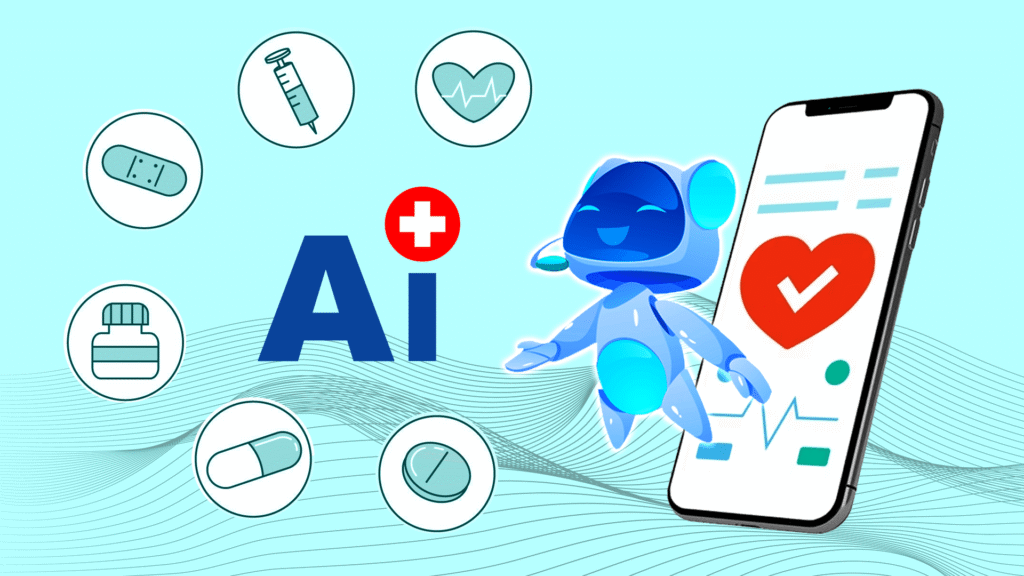
The healthcare industry is witnessing a major transformation — one led by the rise of Artificial Intelligence (AI). What was once a futuristic concept is now an everyday reality in modern healthcare systems. From AI-powered diagnosis tools to smart patient engagement platforms, AI is revolutionizing how healthcare apps are designed, developed, and deployed.
As we move deeper into 2025, AI healthcare app development is no longer just about technology — it’s about building intelligent ecosystems that deliver faster diagnoses, personalized treatments, and seamless patient experiences. Let’s explore how AI is reshaping healthcare app development and driving digital health innovation across the globe.
The Rise of AI in Healthcare App Development
Over the past few years, AI has evolved from being an experimental technology to a core pillar of modern healthcare innovation. The global AI in healthcare market is projected to surpass $200 billion by 2030, driven by rapid adoption in diagnostics, telemedicine, and digital therapeutics.
Healthcare app developers are now leveraging machine learning (ML), natural language processing (NLP), predictive analytics, and computer vision to create apps that go beyond traditional health tracking. These AI-powered apps can analyze patient data in real time, predict diseases, recommend treatments, and even assist in clinical decision-making — helping healthcare professionals save both time and lives.
Key Areas Where AI Is Transforming Healthcare Apps
AI’s impact on healthcare app development can be seen across multiple domains. Let’s break down some of the most prominent use cases reshaping the digital health landscape in 2025.
a. Predictive Analytics for Early Diagnosis
AI enables predictive analytics that help detect diseases long before symptoms appear. Healthcare apps now analyze historical health data, genetics, and lifestyle patterns to identify risks of chronic illnesses such as diabetes, heart disease, and cancer.
For instance, an AI healthcare app can predict the likelihood of a heart attack based on user data, wearables, and ECG readings — enabling preventive intervention and personalized treatment.
b. AI-Powered Virtual Health Assistants
Virtual assistants and chatbots, powered by AI, are transforming how patients interact with healthcare systems. These digital assistants provide 24/7 medical guidance, appointment scheduling, symptom checking, and medication reminders.
They not only enhance accessibility but also reduce administrative burden on healthcare providers. By integrating NLP and sentiment analysis, these assistants deliver human-like, empathetic conversations that improve user experience.
c. Enhanced Medical Imaging and Diagnostics
AI algorithms excel at identifying patterns invisible to the human eye. In healthcare app development, this capability has been game-changing. AI-driven imaging tools can analyze X-rays, MRIs, and CT scans with remarkable accuracy, assisting radiologists in detecting abnormalities faster and more reliably.
In 2025, many mobile health apps now integrate AI-based diagnostic modules that support remote consultations and real-time image-based disease detection.
d. Personalized Treatment and Care
Personalization is a cornerstone of modern healthcare, and AI is taking it to the next level. By analyzing patient data, genomics, and lifestyle habits, AI helps healthcare apps create custom treatment plans tailored to each individual.
For example, AI algorithms can recommend diet and exercise plans, monitor medication adherence, and adjust treatment paths based on ongoing health metrics — offering truly personalized digital care.
e. Streamlined Clinical Workflows
AI also plays a vital role in optimizing back-end operations for hospitals and clinics. Through automation and predictive analytics, healthcare apps now streamline processes such as appointment management, electronic health records (EHR) handling, billing, and patient communication.
This reduces human error, saves time, and allows healthcare professionals to focus on what matters most — patient care.
Core Technologies Powering AI Healthcare Apps
The success of AI-driven healthcare apps lies in the integration of cutting-edge technologies. Below are the key AI technologies transforming app development in 2025:
- Machine Learning (ML): Enables predictive insights and intelligent recommendations.
- Natural Language Processing (NLP): Powers conversational chatbots and data interpretation from clinical texts.
- Computer Vision: Facilitates medical imaging analysis and pattern recognition.
- Deep Learning: Improves disease detection, diagnostics, and patient monitoring.
- Predictive Analytics: Anticipates medical outcomes and patient behavior trends.
- Edge AI & IoT Integration: Connects wearable devices for continuous, real-time health monitoring.
Benefits of AI in Healthcare App Development
The integration of AI in healthcare app development offers tangible benefits for both patients and healthcare organizations:
Faster and More Accurate Diagnosis
AI-driven algorithms enhance accuracy in identifying diseases and health anomalies.
Improved Patient Engagement
Virtual assistants and personalized recommendations enhance user interaction and retention.
Operational Efficiency
Automation of repetitive administrative tasks saves time and reduces costs.
Data-Driven Decision Making
AI helps healthcare professionals interpret complex medical data for better treatment outcomes.
Enhanced Data Security
AI algorithms can detect and prevent cybersecurity threats, ensuring patient privacy.
Real-World Examples of AI in Healthcare Apps
Several healthcare platforms are already harnessing AI to revolutionize medical care:
- Ada Health – Uses AI for symptom analysis and diagnostic assistance.
- AliveCor – Employs AI for ECG interpretation and heart monitoring.
- Babylon Health – Provides AI-driven telemedicine consultations.
- PathAI – Uses AI to improve accuracy in pathology diagnostics.
- Code Brew Labs – Develops custom AI healthcare apps with predictive analytics and telehealth integration, empowering hospitals and startups with next-gen digital health solutions.
Challenges in AI Healthcare App Development
While the opportunities are immense, developing AI healthcare apps comes with its share of challenges:
- Regulatory Compliance (HIPAA, FDA)
- Developers must ensure patient data security and privacy at every level.
- Data Quality and Bias
- Inaccurate or incomplete datasets can lead to flawed AI predictions.
- Integration Complexity
- Merging AI with existing EHR systems and hospital infrastructure requires specialized expertise.
- Ethical Considerations
- Ensuring transparency and fairness in AI decision-making remains crucial for patient trust.
The Future of AI Healthcare Apps: What to Expect Beyond 2025
The future of healthcare app development will see AI evolve into a comprehensive digital health ecosystem. We can expect:
- Greater use of Generative AI for medical research and drug discovery.
- Expansion of AI-powered preventive care apps.
- Integration of Augmented Reality (AR) with AI for remote surgeries and diagnostics.
- Voice-based AI interfaces for elderly and differently-abled patients.
- Stronger emphasis on data security, personalization, and automation.
By 2030, AI healthcare apps will not just assist doctors — they’ll actively collaborate in diagnosis, treatment, and care management, making healthcare smarter, faster, and more accessible to everyone.
Conclusion
AI is not just transforming healthcare app development — it’s redefining the future of global health. From predictive analytics and smart diagnostics to personalized care and automation, AI continues to bridge the gap between technology and human well-being.
As we progress through 2025, organizations looking to innovate in healthcare must embrace AI-powered development to stay ahead. And with pioneers like Code Brew Labs leading the charge in building intelligent, secure, and scalable healthcare apps, the next generation of digital health innovation is already here.




